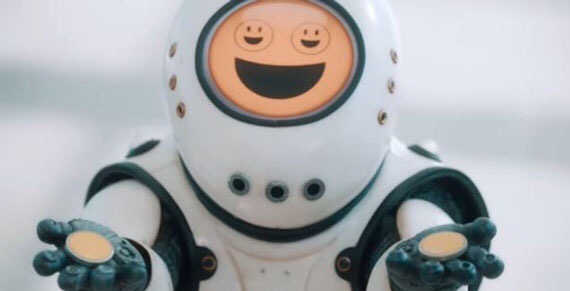Last night’s episode of Doctor Who began with a discussion of why the seats in the TARDIS are so far away from the controls, the fact that you don’t steer it you negotiate with it, and the fact that he doesn’t know how much it cost because he stole it. There is also a reference to an oath the Doctor took not to go off-world. But the Doctor is clearly not going to keep that promise.
Bill says she wants to go to the future, and we see an Earth colony with robots who kill people when they become unhappy. There are small worker-bee robots and larger ones that serve as the interface with them. The interface robots speak emoji. When they get there, no other people are there. The Doctor theorizes that the robots were sent ahead to prepare before colonists arrive. But he realizes he is wrong, and is certain once he realizes that the bones of the human set-up team are serving as fertilizer in the gardens. He also realizes that the machines try to kill those who stop smiling. The Doctor and Bill escape the city but then the Doctor goes back, concerned that the colonists who are on their way will be expecting a “garden of Eden” and instead will find a death trap.
While the Doctor sets out to blow up the ship at the center of the colony, Bill discovers an electronic book and learns that humans came there because Earth had to be evacuated. And it turns out that he was wrong about somehing else: the colonists are in the ship in pods in suspended animation. The Doctor deduces that the microbots (Vardi) were supposed to maintain happiness, but when the first person from among the original crew died, grief cascaded through the population, and the machines started killing them.
The Doctor manages to reset the machines. But he also recognizes that the machines had become sentient. And so the Doctor negotiates a coexistence between the humans and the Vardi.
The episode includes some nice reflections on why the Doctor likes traveling in a police box. And it onviously focuses on the misguided yet widespread view that paradise consists of everyone being happy all the time.














